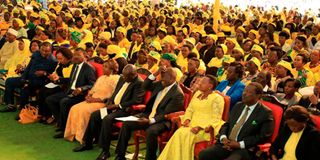You misunderstood the President: Gachagua dims women's hope on political leadership

President William Ruto with other Kenya Kwanza leaders during the Kenya Kwanza Women Charter Conference at Nyayo National Stadium on June 10, 2022.
What you need to know:
- Political parties will play a critical role in the realisation of the two-thirds gender rule.
Gender CS Aisha Jumwa has met with political party leaders to marshal support for the gender quota bills recommended by a taskforce.
At the heart of giving life to the two-thirds gender provision in Kenyan elections are political parties.
It is, therefore, not surprising that the multi-sector working group on the realisation of the principle provided for in Article 27(8) of the Constitution ended up with a recommendation that puts political parties at the centre of electing more women members of the National Assembly, senators, governors and members of the county assemblies.
It recommended an amendment to the Elections Act to compel each political party to present not just a list of candidates for parliamentary and county elections but one that adheres to the guideline that neither men nor women should surpass the two-thirds threshold.
Already, Gender Cabinet Secretary Aisha Jumwa, who appointed the taskforce, has met with political party leaders, including Raila Odinga (ODM) and Kalonzo Musyoka (Wiper), to marshal support for the gender quota bills.
Whilst the women hope for an immediate change, in the timetable of politicians, the wait may be longer than expected.
On March 7 during the launch of the G7 strategy by the seven women governors targeted at encouraging more women to get into elective politics, President William Ruto gave women hope.
“We must, as a party, lead from the front… We must also agree that if a man is a candidate for president in our party, a woman must be the deputy and if a woman is the candidate, the running mate must be a man,” said Dr Ruto, who is also the leader of United Democratic Alliance (UDA).
Not so fast
This is, however, delayed hope. Deputy President Rigathi Gachagua said the President’s remarks were misunderstood to mean that the rules will be enforced during their reign.
“As the President said yesterday (on March 8), we’ve talked and we’ll continue talking on how to involve women in Executive leadership in future…. though others misunderstood him. The President said he would speak with me and we’d plan for them after the end of our term.”
In previous attempts to pass the gender law, women legislators said their male counterparts failed them even after buying them flowers and treating them to dinner, a lobbying tactic that clearly never flew.
During the governors' event, Mr Gachagua affirmed that his boss was the number one champion of women’s rights and it is during his term that the law on the two-thirds gender rule will come to pass.
Already, Azimio la Umoja One Kenya coalition party has complained about delays in working on bills sprouting from the National Dialogue Committee, whose recommendations include the outcome of Ms Aisha’s taskforce.
The Elections (Amendment) Bill is among the nine bills committed to the joint Justice and Legal Affairs of the National Assembly and Senate committee, which is to provide a framework for the enactment of the bills.
Mr Gachagua’s remarks project delayed hope for women to rise to Executive leadership through UDA should the duo successfully bid in 2027.





